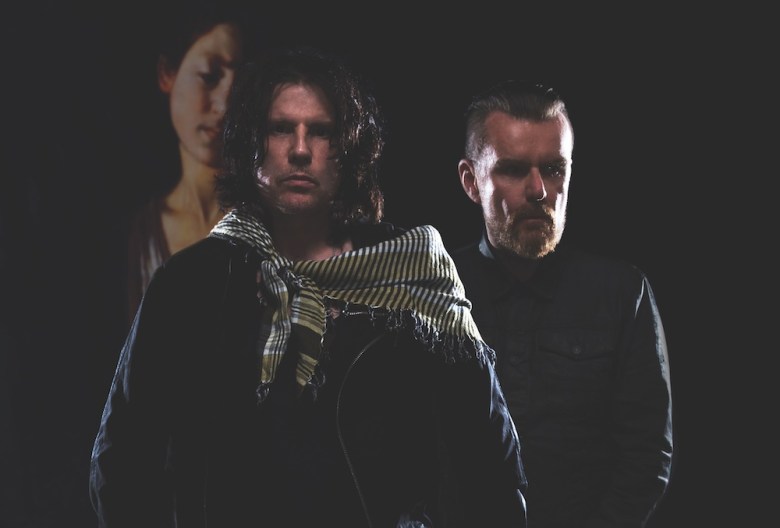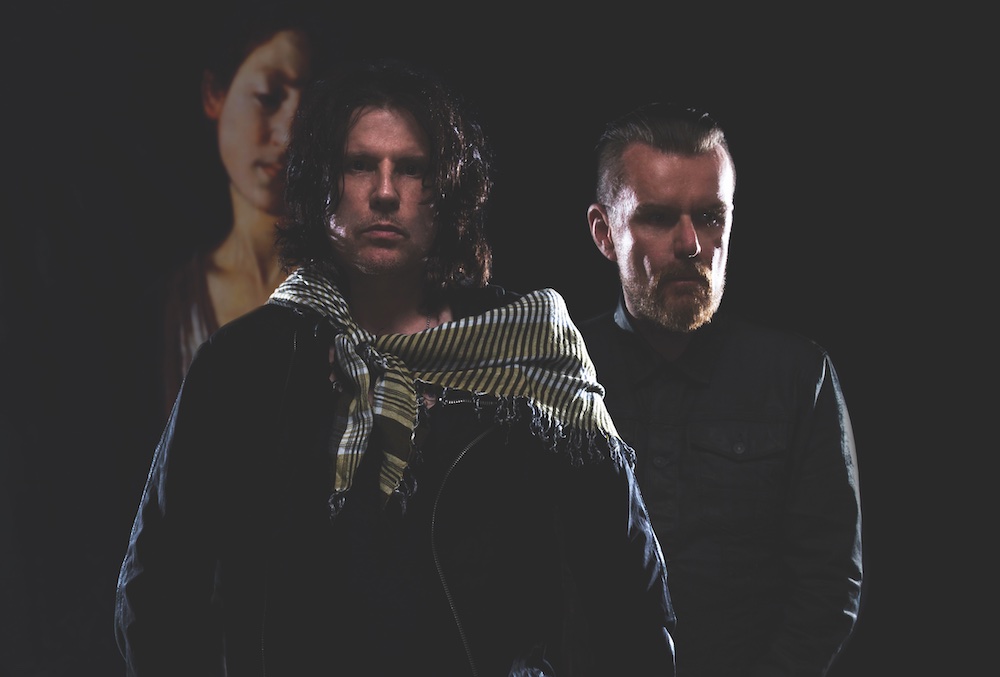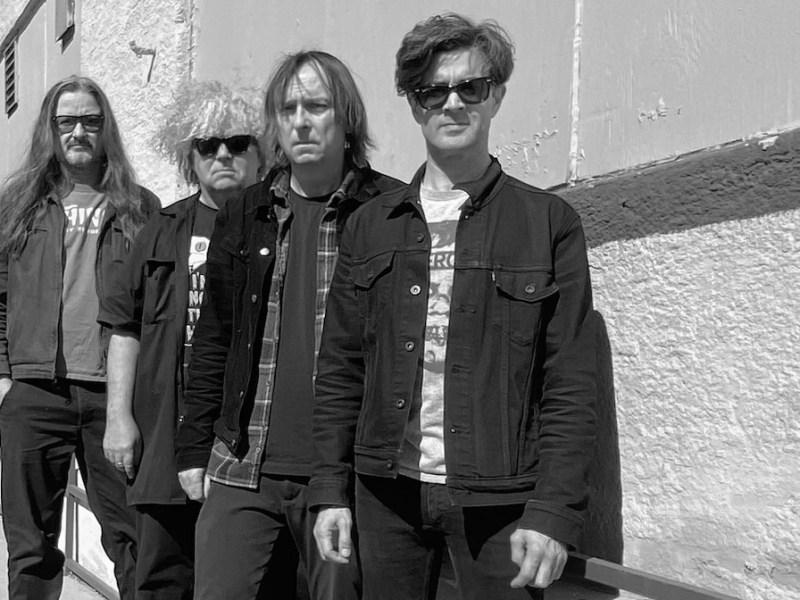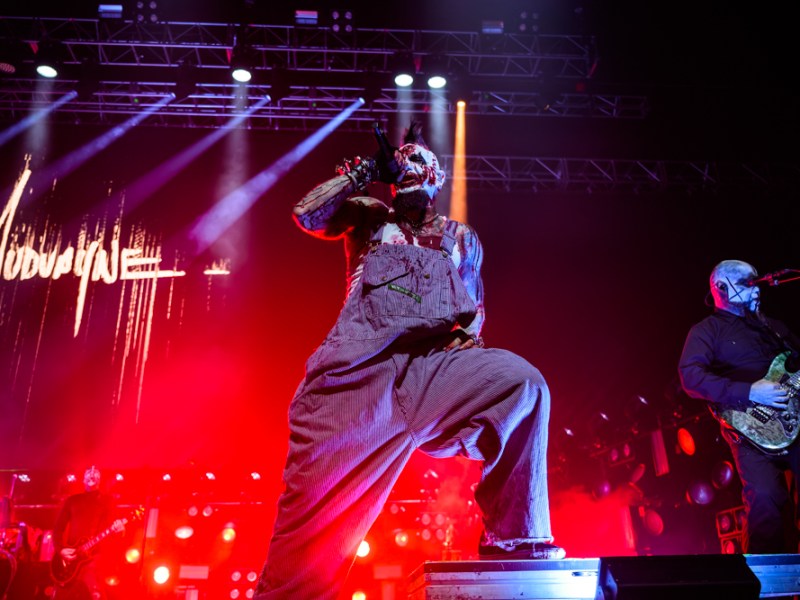 Ian Astbury and Billy Duffy are the core members of The Cult. Credit: Tim Cadiente
Ian Astbury and Billy Duffy are the core members of The Cult. Credit: Tim Cadiente
Every band has an origin story. Even The Cult, who dominated rock radio in the’80s with an arena-ready sound that seemed fully formed.
In reality, a succession of bands led to the post-punk act Death Cult, which morphed into The Cult’s hard-rock-with-goth-trappings approach. Both bands featured the same key members: vocalist Ian Astbury and guitarist Billy Duffy.
Death Cult has now reformed to dive into those essential early years. And, as only makes sense, it’s touring with The Cult on a tour that hits San Antonio’s Majestic Theatre on Tuesday, Oct. 21.
We talked to The Cult’s frontman, Ian Astbury, via Zoom from his home in California to unpack what it means to have both bands touring together.
The Cult gained international fame via hits including “She Sells Sanctuary,” “Love Removal Machine” and “Fire Woman.” Despite a few post-punk touches, anthemic rock has always been part of the The Cult’s fabric, and Death Cult makes it clear where the band came from.
So, how do both sides come together? Will two different bands be onstage with different equipment? Beyond Astbury and Duffy, will they have the same members?
Astbury’s answers were so mysterious he might as well have vanished into a cloak when he told us. Man of hype? We aren’t sure, but Astbury knows how to keep the cards close to his vest.
The following interview has been edited for length and clarity.
What made you decide to reform Death Cult as a separate entity from The Cult, as opposed to just covering some of the songs at regular gigs?
It just felt like we’ve gone full circle. We’re back to a zero point and in some way being a little bit retrospective. We’ve got 11 studio albums as The Cult. Perhaps just reviewing the DNA of the band, of the songwriting partnership, of the relationship and then coming across Death Cult, the origins — what we emerged from, our original influences, our original inception — became fascinating for me. Death Cult happened in a particular moment in the UK in the early ’80s, yet those archetypal elements have been with us since, well, throughout millennia. We live in a dystopian and very complex world. (Laughs.) And I felt that Death Cult was coming from a very pure place. When you’re at a certain age, you’re much more impulsive. You know, sometimes too impulsive.
Agreed.
You know, I train in martial arts, so it’s learning technique and learning to rely on your technique, learning to rely upon what you know about yourself, what you’re good at, your skill set. You’re constantly re-evaluating your abilities in that setting, and it’s the same thing with music. I’m not saying it’s true for everyone, but for me, personally, I’m always taking inventory and considering what I’m doing. Sometimes it’s just great to let it flow.
Death Cult came through. So, it was, like, this kind of reset, zero point. The rest of the world’s looking at The Cult like we’re in a renaissance. The band’s definitely in a renaissance, there’s no doubt. But Death Cult just came up, kept coming up. And we thought, “If we’re going forward, let’s grab everything. Let’s look at everything.”
Swing for the fences.
To a degree. I don’t swing for the fences though. I swing for the fences with intention.
That’s good. A slight caveat, but it adds a lot to the—
No, it’s a caveat. It is. If you swing for the fences, you have no technique. You’re just going for it.
There are online set lists for the shows that The Cult did in the UK highlighting Death Cult. And it looked like it was a continuous set. Essentially, the site has the songs marked as The Cult playing Death Cult covers.
Nonsense.
But that is how the set progressed. A bunch of Death Cult songs and Cult songs with the same group on stage?
In this incarnation of what we’re going to be presenting, what we are saying is a Death Cult set.
So, that was all one band, and this is going to be like a physically different thing. Death Cult is going to play and The Cult is going to play, correct?
Right.
And is Death Cult playing first, like the opener? I’m using the term loosely, but you probably know what I mean.
No. All these conventional terms, I think we can now disperse with them.
Okay.
I honestly feel we’re in this moment now where everything is gloves-off.
Sounds like all the listeners and attendees are going in with question marks. The Cult and Death Cult are going to be there and beyond that, what’s going to happen? We don’t know.
Yeah. Same for us. It’s not like we’re going to tell a story after every song about what it was like going to school in Northern England when I was 11 years old listening to David Bowie. No, it’s in the moment. This is in the moment, and this is what we’ve chosen to present. I saw recently a Schubert piece in Berlin at the National Opera. It was written in 1827, with a poem that was written in the 19th century, presented in a very contemporary way with the Berlin ballet. I looked at that and went, “Oh, we can do anything we want.” You can do anything you want. Led Zeppelin could reform to play Black Sabbath’s set. It doesn’t matter.
I don’t want to get too existential, but yeah, I’ve watched the sunset on Everest. I’ve been there. I’ve studied with the Dalai Lama. Saw Mick Jones throw his Les Paul up in the air at a Clash show in 1978. It’s like Roy Batty in Blade Runner. All these memories are lost like tears in rain. It’s about the moment. The frame is Death Cult and The Cult.
The songs are going to be interpreted in the moment, but molecularly different. Every time you step up to the mic, you’re not getting cookie cutter. It’s not coming out of a digital file. It’s coming out of human beings. So, there is a certain vulnerability and you’re in the moment.
You have all of these wild experiences, right? You mentioned—
Not for me, wild. They were just my experiences. They weren’t wild.
They’re wild for us mere mortals.
Why is it fair to be wild? They were just my experiences.
You had the survival experience in Tibet. All the way back, you identified with punk rockers, with Indigenous peoples. The Cult, going back to the ’80s, didn’t quite fit in anywhere, but you guys were successful on your own terms. Is this what The Cult is? All of these, sort of, outlier types? Disenfranchised?
Amalgamation of our experiences. Everyone’s disenfranchised. Billionaires are disenfranchised. Everyone’s disenfranchised. Some of the happiest people I’ve seen in the world are people that have got absolutely nothing materially, but they have everything in terms of community and relationships, family, their health. In India, for example. Phenomenal. “Disenfranchised,” “outlier,” they’re not my terms. I don’t define myself in that way. It may have come out of my mouth at some point, but the core is just, I mean, I was an immigrant kid, came to North America when I was 11. My mindset was, because I was an immigrant, I was an outsider. I was treated like one. I was with Indigenous kids, kids who came from other countries, like most North Americans. And just found my way, and then music came in.
Why do you think that invitation came to sing?
I was homeless. A friend offered me a room in a house where he was staying.And I wanted to be in London. But I was in London. I was in squats.I was on the street. And I thought about this offer to stay in a room. And it was cheap. But it was in Bradford. And I’m like, Bradford? Bradford was kind of depressed at the time.And it’s near Leeds. Between Leeds and Manchester. I had no desire to really be there.Except to get a room in a house, a roof over my head. And be around other punks, punk kids. So, I thought, “You know, I’ll do that.”And it just so happened that this punk band, Violation, were rehearsing in the basement of the house. And they kicked the singer out.They saw me and they said “Can you sing?” And I’m like, “I don’t know.” “So do you want to jump in? Jump into a rehearsal?” I’m like, “Okay.”And they go, “Do you want to be in the band?” After I’d sang maybe half a Sex Pistols song. It’s like, “What do you know?” It’s like, Sex Pistols? We all knew Sex Pistols.Three chords. It was easy to do. And they just like, said, “You want to be in the band? I was like, okay, cool.It was exciting.”
I thought they were older, cool guys. And I hadn’t been asked to really join anything. You know what I mean? It was exciting. And next thing we know, we’ve got three songs and six songs. By our fifth gig, with six songs, we’re in Sounds. We had a review in Sounds. But by gig five, we had six songs. And we had our first review in a music paper. It happened lightning fast. Didn’t even have a chance to catch our breath. I didn’t. Things were happening so quickly. On the cover of NME. Didn’t even have a record out. Shot by Anton Corbijn at 20.
It’s crazy. It seems like all the way through the end of the Sonic Temple tour was just a continuous escalator of success, but also kind of insanity. It just seems like it got crazier and crazier. Maybe for good, and maybe for bad, or both.
I had a conversation with Lars Ulrich about all of that. I was talking about how big Metallica were. And I said, “There’s a difference between being big and being great.”
Does that mean Metallica is big but not great?
In that analogy, in that particular moment, it was a bit of flex. It was a flex. And I was responding with pretty much, on any given night, be the best that you can be. It doesn’t matter if you’re the biggest commercial artist in the world, or this guy playing on the street. It doesn’t matter. Give it everything you got. That’s what it’s really all about. If you’re playing in minor leagues, major leagues, you turn up, you show up. And you give it your best shot.
$48.19-$96.99, 8 p.m. Tuesday, Oct. 21, Majestic Theatre, 224 E. Houston St., (210) 226-3333, majesticempire.com.
Subscribe to SA Current newsletters.
Follow us: Apple News | Google News | NewsBreak | Reddit | Instagram | Facebook | Twitter | Or sign up for our RSS Feed
Related Stories
Local favorites Chavela are also having a show to celebrate the release of their debut album.
The two nu-metal bands rocked like it was the early aughts again.



